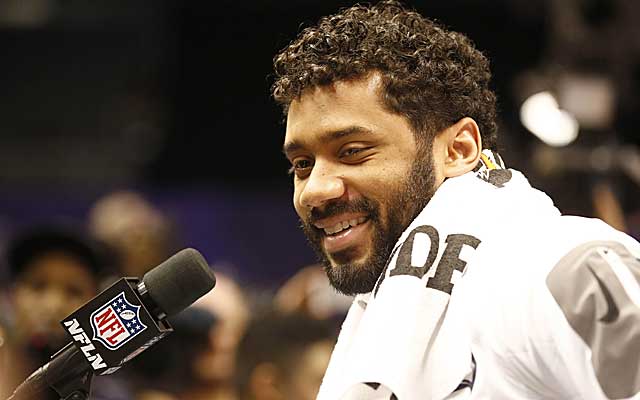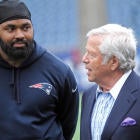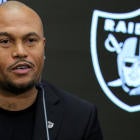The Seattle Seahawks are prepared to make Russell Wilson the NFL's highest paid player during the offseason, according to NFL Media's Ian Rapoport, even if he isn't the same caliber quarterback as Tom Brady, a healthy Peyton Manning or Aaron Rodgers.
Wilson was the NFL's biggest bargain in 2014 with a salary of $662,434. After the Super Bowl, Wilson will enter the final year of a four-year, $2,996,774 rookie contract he received in 2012 as a third-round pick.
Joe Flacco forced the Baltimore Ravens to briefly make him the NFL's highest paid player with a six-year, $120.6 million contract, including $51 million in guarantees, after capping off a stellar postseason in a contract year by being named Super Bowl XLVII MVP. Nobody was considering Flacco as an elite quarterback. Eli Manning was arguably a top 10 quarterback when the New York Giants made him the highest player in 2009 with a six-year, $97.5 million contract extension.
Wilson has just as many Super Bowl victories with better statistics and more accolades than Flacco and Manning had when they got their big deals. Wilson is the game's best dual quarterback. Although Wilson doesn't have the same type of offensive responsibility as elite quarterbacks and has the luxury of playing with NFL's best defense, he is the first starting quarterback to ever make it to two Super Bowls in his first three NFL seasons.
Wilson's most lucrative contract will likely come from letting Andrew Luck set a new NFL salary standard. According to ESPN's Adam Schefter, a contract extension making Luck the NFL's highest paid player is on the horizon. Indianapolis Colts owner Jim Irsay and Luck have separately downplayed the notion of an extension since Schefter first broke the story. If the report is true, Luck could become the NFL's first $25 million per year player with his new deal.
Seahawks general manager John Schneider has said there isn't a timetable for Wilson's new contract. Wilson can reasonably expect to be rewarded right around when the 2015 NFL Draft is held April 30-May 2, which may not make waiting on Luck feasible, based on the timing of Seattle's most recent market setting contracts. Earl Thomas became the NFL's highest paid safety toward the end of last April. Seattle put Richard Sherman at the top of the cornerback pay scale last May 7, the day before the 2014 Draft started.
I have examined the financial relationship between the leader and runner-up for quarterbacks in key contract metrics of average yearly salary, guaranteed money and compensation in the first three new contract years at the end of each regular season during the last five years (2010-14) to create a projection of Wilson's deal. Players who were briefly a leader in a metric but overtaken because of a subsequent deal, like with Flacco when Aaron Rodgers became the NFL's highest paid player less than two months after he did, were not taken into account. The impact of Wilson receiving franchise tags in 2016 and 2017 if he played out his rookie contract instead of signing a new deal was explored. Seattle's contract preferences and conventions were also factored into the equation.
Average Yearly Salary
Average yearly salary is the most popular contract measure with the general public but also misleading and somewhat meaningless because of the lack of security with NFL contracts.
| NFL's highest paid quarterbacks | |||||
| Year | Highest Paid | Average Salary | Second Highest Paid | Average Salary | Percentage Difference |
| 2010 | Tom Brady | $18,000,000 | Eli Manning | $16,250,000 | 10.77% |
| 2011 | Tom Brady/Peyton Manning | $18,000,000 | Eli Manning | $16,250,000 | 10.77% |
| 2012 | Drew Brees | $20,000,000 | Peyton Manning | $19,200,000 | 4.17% |
| 2013 | Aaron Rodgers | $22,000,000 | Matt Ryan | $20,750,000 | 6.02% |
| 2014 | Aaron Rodgers | $22,000,000 | Matt Ryan | $20,750,000 | 6.02% |
| Total | $100,000,000 | $93,200,000 | 7.30% | ||
Eli Manning was used for the second highest average yearly salary in 2011 due to the tie between Brady and Peyton Manning for the highest average. Michael Vick's 2011 contract was widely reported as a six-year, $100 million contract ($16,666,667 average per year). In reality, it was a five-year, $80 million deal (with $35.5 million in guarantees) containing a sixth year at $20 million that voided with Vick's offensive playtime exceeding 35 percent in any year, which occurred in 2011.
The 7.3 percent different between the highest paid and second highest paid quarterback over the last five years suggests a $23.605 million average per year for Wilson.
| Comparing QBs by guaranteed money | |||||
| Year | Most money | Guarantees | Second Most money | Guarantees | Percentage Difference |
| 2010 | Tom Brady | $48,500,000 | Philip Rivers | $38,150,000 | 27.12% |
| 2011 | Peyton Manning | $51,000,000 | Tom Brady | $48,500,000 | 5.15% |
| 2012 | Drew Brees | $60,500,000 | Peyton Manning | $58,000,000 | 4.31% |
| 2013 | Drew Brees | $60,500,000 | Matt Ryan | $59,000,000 | 2.54% |
| 2014 | Colin Kaepernick | $61,000,000 | Drew Brees | $60,500,000 | 0.83% |
| Total | $281,500,000 | $264,150,000 | 6.57% | ||
Technically, Colin Kaepernick's $61 million in guarantees is the most ever in an NFL contract. Slightly less than $13 million is fully guaranteed at signing, which is about one-third of the fully guaranteed amount in other quarterback deals (Jay Cutler and Tony Romo) with a comparable average salary.
The $28 million option bonus in Peyton Manning's 2011 contract with the Colts is included as a part of his guaranteed money even though he was released during a two-day window the team had to exit the deal after the first year without making the payment. Although an option bonus, which is essentially an additional signing bonus that's usually paid in the second or third year of a contract to exercise later years in the deal, doesn't quite provide the same security as a signing bonus, it's unusual for a team to release a player with a lucrative contract before paying it.
The six-year, $78 million deal (worth a maximum of $86 million) containing $50 million in guarantees Sam Bradford signed in 2010 as the first pick overall of the 2010 draft was excluded. Rookie contracts are dictated by an entirely different marketplace than veteran deals.
Applying the 6.57 percent disparity between the quarterback deals with the most and second contract guarantees to Kaepernick's contract, puts Wilson at $65 million in guarantees.
First three new years compensation
First three new years compensation is a different metric than cash flow in the first three years of a deal. The cash flow analysis looks at the compensation in its totality while the new years approach focuses on the amount of money in a contract excluding what a player was scheduled to make before receiving a new deal. It is important because professionals within the industry (agents and team negotiators) typically value deals by new money.
The difference in the two metrics can be illustrated with the five-year contract extension Aaron Rodgers signed in 2013. His cash flow in the first three years (2013-2015) is $62.5 million. The compensation in the first new three years (2015-2017) is $68 million. When Rodgers signed his new contract, he had two years remaining on his deal with $9.75 million and $11 million salaries 2013 and 2014. His two existing contract years for $20.75 million were subtracted from the $88.75 million five year cash flow total to arrive at $68 million. Both metrics have the same dollar amount when a player signs a new contract as a free agent or when his contract is set to expire.
| Comparing first three years of QB contracts | |||||
| Year | Most money | First Three New Years | Second-most money | First Three New Years | Percentage Difference |
| 2010 | Tom Brady | $57,000,000 | Carson Palmer | $55,500,000 | 2.70% |
| 2011 | Peyton Manning | $70,200,000 | Tom Brady | $57,000,000 | 23.16% |
| 2012 | Drew Brees | $61,000,000 | Peyton Manning | $58,000,000 | 5.17% |
| 2013 | Matt Ryan | $68,750,000 | Aaron Rodgers | $68,000,000 | 1.10% |
| 2014 | Matt Ryan | $68,750,000 | Aaron Rodgers | $68,000,000 | 1.10% |
| Total | $325,700,000 | $306,500,000 | 6.26% | ||
The $70.2 million three year total in Peyton Manning's deal with the Colts is the most ever in an NFL contract. Wilson's deal should exceed it by coming in at $73.057 million if Ryan's $68.75 million is used in conjunction with this 6.26 percent difference between the leader and runner-up with this metric.
Franchise tag analysis
Any competent agent will analyze the franchise tag numbers when it's a realistic possibility that his client will receive the designation to prevent him from becoming a free agent. Preliminary numbers can be projected for 2016 if Wilson plays out of his rookie contract even though the 2015 franchise tags haven't been finalized.
An exclusive or non-exclusive franchise tags can be placed on a player. With the non-exclusive franchise tag, a player must be offered a one year contract based on the average of the non-exclusive franchise numbers at his position over the last five years and their percentage of the current year's salary cap or 120 percent of his prior year's salary, whichever is greater. For these purposes, salary means a player's salary cap number, excluding workout bonuses and likely to be earned incentives.
This tag allows the player to negotiate with other NFL teams but if he signs an offer sheet with another club, his team has five days to match the offer. If the offer is not matched, his team will receive two first round picks as compensation from the signing team.
Under the exclusive franchise tag, a player will receive a one-year offer from his team that is the greater of the average of the top five salaries at his position once the restricted free agent signing period of the current year has ended or 120 percent of his prior year's salary. A player cannot negotiate with other teams with the exclusive franchise tag.
The last three quarterbacks (Drew Brees, Peyton Manning and Vick) that received designations were given the exclusive franchise tag. Seattle would likely do the same with Wilson if negotiations for a deal reach a longstanding impasse. The exclusive tag would prevent some quarterback needy team with an abundance of salary-cap room from signing Wilson to an offer sheet in 2016 that the Seahawks might have a difficult time matching.
The best approximation of the 2016 exclusive tag right now can be derived from projecting the 2016 non-exclusive tag and looking at how much greater the exclusive tag has been over the last three years. The 2016 non-exclusive tag for quarterbacks projects to 19.317 million with $142 million and $150 million salary caps in 2015 and 2016. The exclusive tag has been 20.45 percent greater annually than the non-exclusive one since 2012. Based on this data, the exclusive tag should be approximately $23.25 million in 2016.
A second franchise tag in 2017 would be $27.9 million, a 20 percent increase over Wilson's 2016 franchise number. The average of franchising Wilson twice could be used as justification for a long-term deal averaging slightly more than $25 million per year.
Seattle's contract preferences and conventions
Seahawks contracts typically are structured where the guaranteed money consists of base salary guarantees and a signing bonus. Base salary guarantees after the first contract year are for injury only initially at signing in most instances but become fully guaranteed usually five days after the start of the waiver period in each specific year. The waiver period begins the day after the Super Bowl so the guarantee date this year is Feb. 7.
The second contract year was fully guaranteed at signing in some deals before 2013. Marshawn Lynch's $7 million 2013 base salary was fully guaranteed when he signed his deal in 2012. Per game roster bonuses are starting to become more prevalent in Seattle's contracts. Michael Bennett has $1 million and $1.5 million of per game roster bonuses in the 2016 and 2017 of the four year contract he signed in the offseason.
One dynamic that could have an impact on the structure of Wilson's contract is his decision to fire Bus Cook as his agent, who negotiated Jay Cutler's player friendly deal. Wilson has hired his baseball agent, Mark Rodgers, who doesn't have any other NFL clients. The football agent community gets nervous anytime someone perceived as inexperienced is negotiating a lucrative contract, especially with a quarterback, because the likelihood of the player signing a team-friendly deal that could impact future negotiations in the marketplace seems greater.
The concern may be unwarranted with Rodgers. He negotiated an eight-year, $121 million deal for Mike Hampton in 2000 with the Colorado Rockies, which was the richest contract in baseball history at the time. Rodgers being used to fully guaranteed contracts with baseball could work to Wilson's advantage instead. It could be necessary for the Seahawks to make structural concessions with Wilson, like the Green Bay Packers have with Aaron Rodgers. He is the only player on the Packers with a veteran deal that has guarantees after the first contract year.
Thomas and Sherman's contracts should be the team's most relevant deals to Wilson's negotiations. Those are Seattle's only contracts that set the marketplace at a position. Thomas' $10 million average per year is 14.29 percent greater than the $8.75 million average of Jairus Byrd's deal with the New Orleans Saints. Byrd preceded Thomas as the NFL's highest paid safety.
Sherman's contract, which averages $14 million per year, is 16.67 percent higher than the one year, $12 million deal Darrelle Revis signed last March with the New England Patriots to become the NFL's highest paid cornerback. Technically, Revis signed a two-year, $32 million contract but it was designed to be a one year deal. Thomas and Sherman's deals combined are 15.66 percent greater than the previous salary benchmarks at their respective positions. When this percentage difference is applied to Rodgers' deal, it yields approximately a $25.5 million average per year for Wilson.
Thomas received $25.725 million in guarantees. His signing bonus was $ 9.5million so 36.93 percent of his guarantees are in that form. Thomas' signing bonus was layered on top of the 2014 salary he was scheduled to make prior to his new deal.
Precisely $11 million of Sherman's $40 million in guarantees was a signing bonus. Just over 27 percent of his guarantees are signing bonus. Sherman's 2014 base salary remained the same as it was before the extension.
The percentage of Wilson's guarantees as signing bonus should fall somewhere between Thomas and Sherman's based on how these deals are structured.
Result
Objectively, the data suggests that a contract averaging in the $24 million per year neighborhood with $65 million in guarantees and slightly over $73 million in the first three new years is appropriate for Wilson. Seattle has preferred four-year deals or extensions in recent years. Cliff Avril, Bennett, Kam Chancellor, Lynch, Sherman, Thomas, Max Unger and K.J. Wright signed for this length of time. A five- or six-year extension may be in order for Wilson to mirror the length of most lucrative quarterback deals.
Thomas and Sherman's structure suggests that Wilson should receive a $20 million to $25 million signing bonus. Wilson earned the fourth year "proven performance" escalator for third- through seventh-round picks under the 2011 Collective Bargaining Agreement's rookie wage scale. His 2015 salary increases to the lowest restricted free agent tender since he hit the 35 percent offensive playtime mark in two of his first three seasons. If the 2015 salary cap is $142 million, the lowest restricted free agent tender will be $1.528 million. Wilson's 2015 base salary will likely equal whatever the final number is because that would be consistent with their deals.
The effect on Seattle's salary cap
Schneider acknowledged Jan. 27 at Super Bowl media day that a new Wilson pact would present roster challenges the team hasn't faced before with Wilson under his rookie contract. Wilson's 2015 cap number shouldn't be more than $6.75 million with the new deal. The bigger impact will begin taking place in 2016 when Wilson starts having large cap numbers.
The deal won't prevent the Seahawks from keeping Lynch in 2015 at his $8.5 million cap number. That's because no more than $5 million of the team's projected $18.618 million in cap space once the top 51 players are accounted for by including tenders for restricted free agents and exclusive rights players with expiring contracts should be used with Wilson. There should still be enough cap room to extend linebacker Bobby Wagner's contract while retaining Lynch. Wagner's deal shouldn't take up more than $2.5 million of Seattle's existing 2015 cap room based on how the team structures contracts.
Defensive tackle Brandon Mebane and tight end Zach Miller, who are on injured reserve, could be cap casualties. The Seahawks would gain $5.5 million cap space by releasing Mebane. $2,890,625 of cap room would be freed up by parting ways with Miller.
It may become more challenging to re-sign left tackle Russell Okung with Wilson's new deal. 2015 is also his contract year. Although he hasn't consistently played at a high level since his 2012 Pro Bowl season, he probably won't be interested in a new contract that's less the six-year, $48.5 million deal (with $29.3 million guaranteed and worth a maximum of $58 million) he signed in 2010 as an unproven commodity when he was the sixth overall pick in the Draft.
Joel Corry is a former sports agent who helped found Premier Sports & Entertainment, a sports management firm that represents professional athletes and coaches. Before his tenure at Premier, Joel worked for Management Plus Enterprises, which represented Shaquille O'Neal, Hakeem Olajuwon and Ronnie Lott.
You can follow him on Twitter: @corryjoel | You can email him at jccorry@gmail.com





















